Memorial Day Weekend
In honor of Memorial Day, we will be stepping away from the computers this weekend. We'll see you again Tuesday, June 1.
In honor of Memorial Day, we will be stepping away from the computers this weekend. We'll see you again Tuesday, June 1.
 The American Booksellers Association annual meeting yesterday celebrated the resilience and strength of booksellers and the association after a most difficult year.
The American Booksellers Association annual meeting yesterday celebrated the resilience and strength of booksellers and the association after a most difficult year.
Despite the many difficulties, the association is in a relatively solid position. As new president Bradley Graham of Politics & Prose, Washington, D.C., stated, the ABA lost 80 members in 2020 because of store closings, but so far this year, it added 107 new members, and now has some 1,700 member companies in 2,100 locations.
The new members highlight how "the profile of indie bookselling is changing and expanding," Graham said. Of the 107 new member stores, 23 are BIPOC-owned, five are LGBT, 18 are online-only, eight are popups, two are mobile and one is events-only.
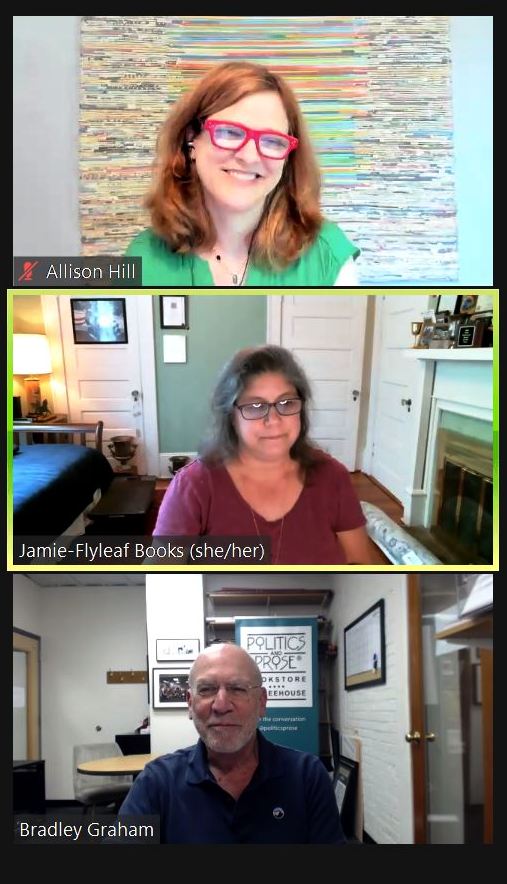 |
|
| (From top) Allison Hill, Jamie Fiocco, Bradley Graham | |
Although the association braced itself for financial difficulties when the pandemic hit, "overall the damage wasn't as bad as expected," Graham said. Revenue for the year was down "only" $700,000, about 11.5%, from pre-pandemic levels. The association, whose annual budget is $7 million and which has about 35 staff members, suffered "a couple financial blows," including $600,000 from not holding the Winter Institute in person and $400,000 from the cancellation of BookExpo.
But the ABA was helped by a surge of IndieCommerce orders and the addition of IndieCommerce members. In addition, the virtual Winter Institute drew higher than expected registration revenue and sponsorship and partner support. Membership renewals have been higher than forecast, and the jump in members helped. At the same time, the ABA saved $400,000 by not holding Winter Institute in person and avoided a cancellation fee. ABA staff has taken measures to control and cut costs.
As a result of the rosier than expected budget picture, the ABA is "giving some funds back to stores," Graham said. IndieCommerce users will receive a rebate of two months' worth of the 1% user fee, and all ABA members will receive a rebate of a month's worth of dues.
Because of the strong stock market, the value of the ABA's investment portfolio has jumped to about $32 million, which is important because income from the portfolio helps support the association, since dues and revenues aren't enough to meet expenses. The board did spend "substantial sums" for some key programs, particularly the #BoxedOut marketing campaign last fall, and will spend more on an upgrade of IndieCommerce.
Board members, staff and association members were repeatedly praised for all they had done and the help they provided others during the most difficult year. Special thanks went to outgoing president Jamie Fiocco of Flyleaf Books, Chapel Hill, N.C.; outgoing board member Pete Mulvihill of Green Apple Books, San Francisco, Calif.; and Chris Morrow, who left the board recently after selling Northshire Bookstore, Manchester Center, Vt., and Saratoga Springs, N.Y.
As Graham said, Fiocco provided "steadfast leadership during incredibly difficult times," while Mulvihill and Morrow "brought a lot of insight and wisdom and wonderful camaraderie, and they'll be missed very much."
In her report, CEO Allison Hill noted, "Whether your sales were devastatingly down or, in some cases, surprisingly up, most of you still reported working harder and with more expenses and more uncertainty than at any other time in the history of your stores. And we know there were personal challenges for many as well."
She outlined many of the ways the association worked to help members during the past year, including adding "regular financial and legal webinars, technology and marketing meetups, workshops, reading series, author events for your customers, and more." The association communicated more often in a variety of ways with members and bolstered its IndieCommerce and IndieLite operations (which became all the more important to booksellers during the pandemic), boosting functionality, customer service support and safeguards. The ABA's advocacy efforts shifted somewhat to concerns about PPP money and disaster loans, etc.
For the association, as Hill put it, "Diversity, equity, inclusion and representation were a priority this year and although we still have a long way to go, we made progress thanks to the commitment of the ABA staff, the commitment of the ABA board, and in great part due to the input, efforts and courage of those who spoke up at Town Hall last year and previous years, those who reached out to us to engage, and the former and current members of the ABA's Diversity Equity & Inclusion Committee....
"ABA created opportunities to support underrepresented and marginalized members. We did our own work around antiracism and equity, which was an important foundation for that, for the staff, the board and members. We addressed safety concerns raised by BIPOC members with a more robust code of conduct and sessions on microaggressions and deescalation. We worked on not just checking a box, but on institutionalizing antiracism, representation and equity, making it not just what we do but who we are. The commitment and the work is continuing. Because it's important. Because it represents our values. Because it ensures that we're supporting all of our members. And because there is a business need for our industry to better reflect and meet the needs of all of our colleagues and customers."
Hill noted some of the "positive effects" of the pandemic, including "a renaissance in reading, a recommitment to local, innovation in our model, the extension of events to the virtual world, and a real seat at the e-commerce table. We also have a sea change for Amazon. We felt that momentum when we launched the #BoxedOut campaign last October, we contributed to it when we sent ABA's antitrust white paper to attorneys general across the country and joined some other small businesses to start Small Business Rising, and now we're seeing real movement."
She said, too, that the ABA is "looking at bigger levers to push. We're having conversations with publishers as strategic partners. We're working on a strategic plan for the association. We've been talking to economists about our model and what it would take to support a livable wage and long-term sustainability, what kind of changes would be required. We're working on the future of e-commerce and what the most robust solutions for the stores look like."
She ended on a very positive note, saying, "All of us did hard things this past year. We also did great things. And we will continue to do great things--working together--in the year ahead." --John Mutter
 The board of the American Booksellers Association and booksellers from around the country convened virtually yesterday to discuss a wide variety of topics, including the sustainability of bookselling, future conferences and events, and facilitating connections with small presses and BIPOC presses.
The board of the American Booksellers Association and booksellers from around the country convened virtually yesterday to discuss a wide variety of topics, including the sustainability of bookselling, future conferences and events, and facilitating connections with small presses and BIPOC presses.
Margins & Terms
One of the biggest topics of discussion during the town hall was bookselling's "sustainability problem," and how booksellers can successfully advocate for more from publishers. Board president Bradley Graham, Politics & Prose, Washington, D.C., said that whenever the ABA or the board has conversations with publishers, "we mention it and we push" when it comes to things like terms and discounts. Booksellers hope for "10 more points" and a "straightforward 55," with Pete Mulvihill, Green Apple Books, San Francisco, Calif., adding that there has been some incremental improvement, with a major publisher adding two points during the pandemic, but there is still much more to be done.
Kelly Estep, Carmichael's Bookstore, Louisville, Ky., encouraged booksellers to take part in the ABACUS survey, as there is a "real need for data," and Angela Maria Spring, Duende District Books, Washington, D.C., and Albuquerque, N.Mex., emphasized that that data is so important for bookstores with nontraditional or alternative models. Michelle Malonzo, Changing Hands, Tempe & Phoenix, Ariz., pointed out that as valuable as social media influencers are for promoting books to the public, "booksellers are the OG influencers."
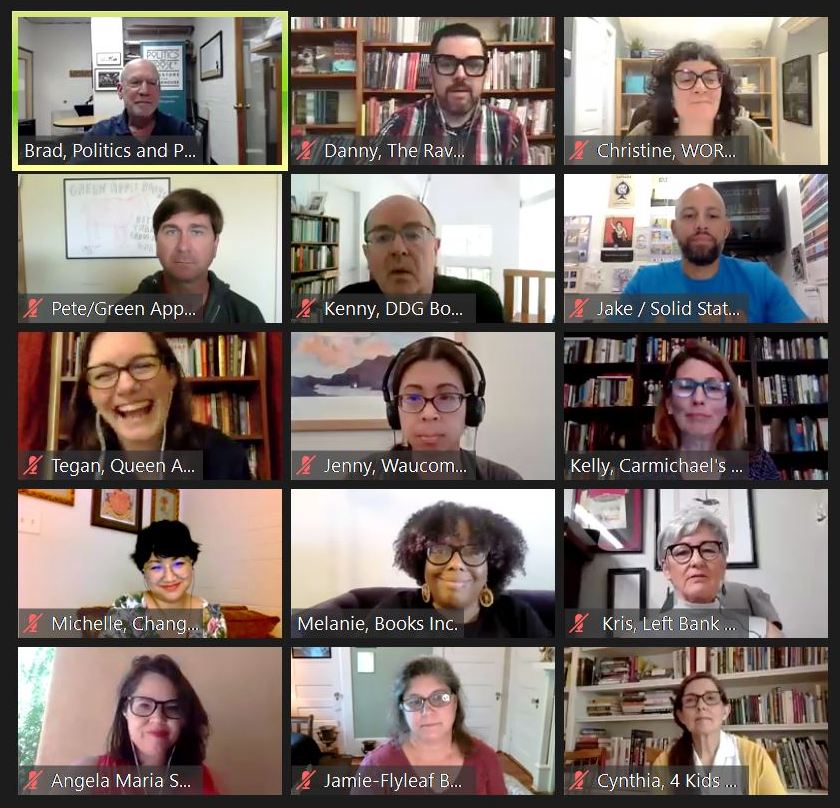
Post-Pandemic Conferences and Events
ABA CEO Allison Hill explained that while it was too late to make this summer's Children's Institute an in-person event, booksellers will be gathering in-person again when the ABA hosts Winter Institute 2022 in Cincinnati, Ohio, next February. The ABA is looking at creating a virtual component for WI that would most likely take place a few weeks later and use some of the programming from the in-person event, but include new programming as well as networking and chatting opportunities.
Asked about BookExpo, which was retired last year by ReedPop, Hill said that the ABA has no plans to host anything in spring 2022. However, the association is in a "discovery period" and trying to figure out what a potential successor or follow-up to BookExpo might look like in 2023. She stressed that the ABA wants to "reimagine" the show and is not interested in simply creating a "BookExpo 2.0." Estep added that if booksellers attend the U.S. Book Show or Edelweiss Bookfest, the board and ABA staff would be interested in hearing feedback about whether those shows met booksellers' needs.
IPS Centralization
During a discussion about the upcoming centralization of Ingram's IPS distribution in its Jackson, Tenn., warehouse, IPS field sales support manager Leslie Jobson and field sales manager Johanna Hynes noted that changes have already been made in just the last six weeks because of bookseller feedback, and they encouraged booksellers to give frequent feedback once the warehouse shift takes effect next week. Acknowledging that there may be a bit of a tough start, they said Ingram is working with FedEx and UPS to improve shipping times and hope to make sure that "this is a system that will work for you," before the fourth quarter.
Stronger Partnerships with Library Associations
The board was very supportive of the suggestion that the ABA work to form stronger partnerships with library associations and help member bookstores form relationships with their local libraries. Joy Dallanegra-Sanger, the ABA's chief operating officer, said that the ALA has reached out to the ABA, and there will soon be an announcement about a special discount for booksellers who'd like to attend the ALA's annual meeting this year.
Small and BIPOC Presses
On the subject of what the ABA can do to facilitate connections with small presses and BIPOC presses, the board members reported that they are very much in favor of this and they are "working toward this." There is work that publishers themselves can do in making sure that sales reps are aware of their small press and diverse titles, and Dallanegra-Sanger mentioned that over the years the ABA has done a lot of work in bringing university presses and academic presses to events like Winter Institute, and would like to do the same with more small presses and BIPOC presses. She also encouraged booksellers to reach out to her (joy@bookweb.org) with the names of specific presses to contact. --Alex Mutter
Total net book sales in March in the U.S. rose 40.2%, to $896.1 million, compared to March 2020, representing sales of 1,358 publishers and distributed clients as reported to the Association of American Publishers. For the year to date, total net sales rose 22.3%, to $3.06 billion.
The large gains in revenues in March reflect in part the beginnings of the Covid-19 pandemic in March 2020, when lockdowns were instituted across the country.
Trade sales rose 34.2% in March, to $743.9 million, and rose 24.9% in the first three months of the year, to $2.1 billion. March hardcover sales rose 50.9%, to $293.7 million; paperbacks were up 27.7%, to $239.9 million; mass market was up 34.6%, to $20.6 million; and board book sales rose 46.5%, to $15.3 million.
Total revenues across all categories for March 2021 were up 40.2% compared to March 2020, coming in at $896.1 million. Year-to-date revenues were up 22.3%, at $3.1 billion for the first three months of the year. In March, e-book sales rose 21%, to $88 million. Downloaded audio rose 16.7%, to $58.5 million. Physical audio slumped 16.1%, to $1.6 million.
Sales by category in March 2021 compared to March 2020:
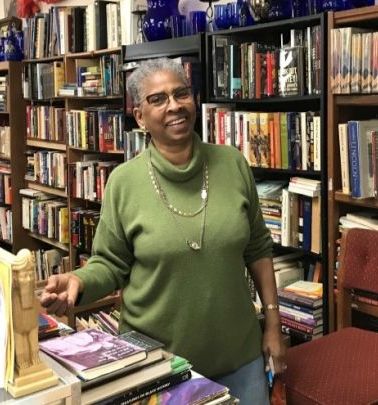 |
|
| Willa Robinson | |
Willa Robinson, the owner of Willa's Books & Vinyl in Kansas City, Mo., has launched a GoFundMe campaign to help find a new location for her bookstore, the Kansas City Star reported. So far the campaign has raised $7,665 toward a $10,000 goal.
She told the Star that her building, in which the bookstore has resided for the last six years, has been sold to a real estate developer. She did not receive any warning or notice, she added, and only learned of the sale when her husband read an article about it in the paper. She is also unsure when exactly she'll have to move, but expects she still has a few months.
Robinson called the sale of the building an "uprooting" of its small-business tenants. Some, she noted, are already starting to move while others are waiting a bit longer. "I wasn't intending to move again, but it might be a good thing."
Robinson opened her bookstore in 2007. The inventory focuses on Black literature and history, with Robinson estimating that 95% of her titles are about Black people and the African diaspora. The bookstore has a speciality in rare African American books and it also serves as an incubator for local, Black-owned businesses. She added: "It's important to have a Black bookstore in this community."
.jpg) |
|
| Lois Ehlert | |
Lois Ehlert, the author and illustrator "whose cut-and-paste shapes and vibrant hues in books including Chicka Chicka Boom Boom put her among the most popular illustrators of books for preschoolers of the late 20th century," died May 25, the Associated Press reported. She was 86. Ehlert graduated from Milwaukee's Layton School of Art and worked in graphic design before she began illustrating children's books in her 50s, starting with 1987's Growing Vegetable Soup.
"Every book Lois made grew out of her love of folk art, nature, and most importantly color," said Allyn Johnston, the v-p and publisher of S&S Children's Publishing imprint Beach Lane Books who edited 29 of Ehlert's 38 books. "She never took herself too seriously--in fact, her subtle and impish sense of humor was one of her biggest creative strengths. And what she cared about most was inspiring young children to pay attention to the beauty of our world, to make things of their own, and to laugh and have fun while doing it."
In addition to Chicka Chicka Boom Boom, which has sold more than 12 million copies across all formats, Ehlert's works include Holey Moley; Hands; The Scraps Book; Mice; Ten Little Caterpillars; RRRalph; Lots of Spots; Boo to You!; Leaf Man; Waiting for Wings; Planting a Rainbow; and Color Zoo, which received a Caldecott Honor.
The Milwaukee Journal Sentinel also noted that "Michelangelo painted on the ceiling of the Sistine Chapel. That would be too high up for little kids to see, so Milwaukee's Lois Ehlert put her art on the floor leading into the Milwaukee Public Library Central Library's children's room when it was renovated in 1998."
Tributes to Ehlert appeared on social media, some mourning the loss of both her and Eric Carle within days of one another. Author and illustrator Jarrett J. Krosoczka posted: "The children's book community lost another icon this week--Lois Ehlert. Her work was unlike anything we had seen before the 1989 publication of Chicka Chicka Boom Boom. We're used to digital technology now, but her cut paper came well before ubiquity of Photoshop and Illustrator. So many of Ms. Ehlert's books have lined our bookshelves and they will forever be a part of the fabric of our kids' reading lives."
Simon Kids tweeted: "We're so sad to say goodbye to legendary children's book author & illustrator Lois Ehlert, creator of many beloved picture books including Chicka Chicka Boom Boom, which she illustrated. Lois was just like her art--inventive, colorful, unexpected and funny! We'll miss her so much."
Independent booksellers also paid their respects, including A Likely Story Bookstore, Sykesville, Md. ("We're so sad to say goodbye to two iconic children's authors/illustrators--Eric Carle and Lois Ehlert. Their contributions as authors and illustrators to children's literature will live on through their stories."), Wishing Tree Books, Spokane, Wash. ("Yesterday was a double whammy of heartbreak. Thank you for all the rhymes, colors, stories, inspiration, and joy you brought us over the years, Lois Ehlert. We will miss you.") and Otto Bookstore, Williamsport, Pa. ("Dearest Lois Ehlert, We wish you a rainbow. All thanks and love, Your grateful readers and booksellers. 'A Leaf Man's got to go where the wind blows.' ").
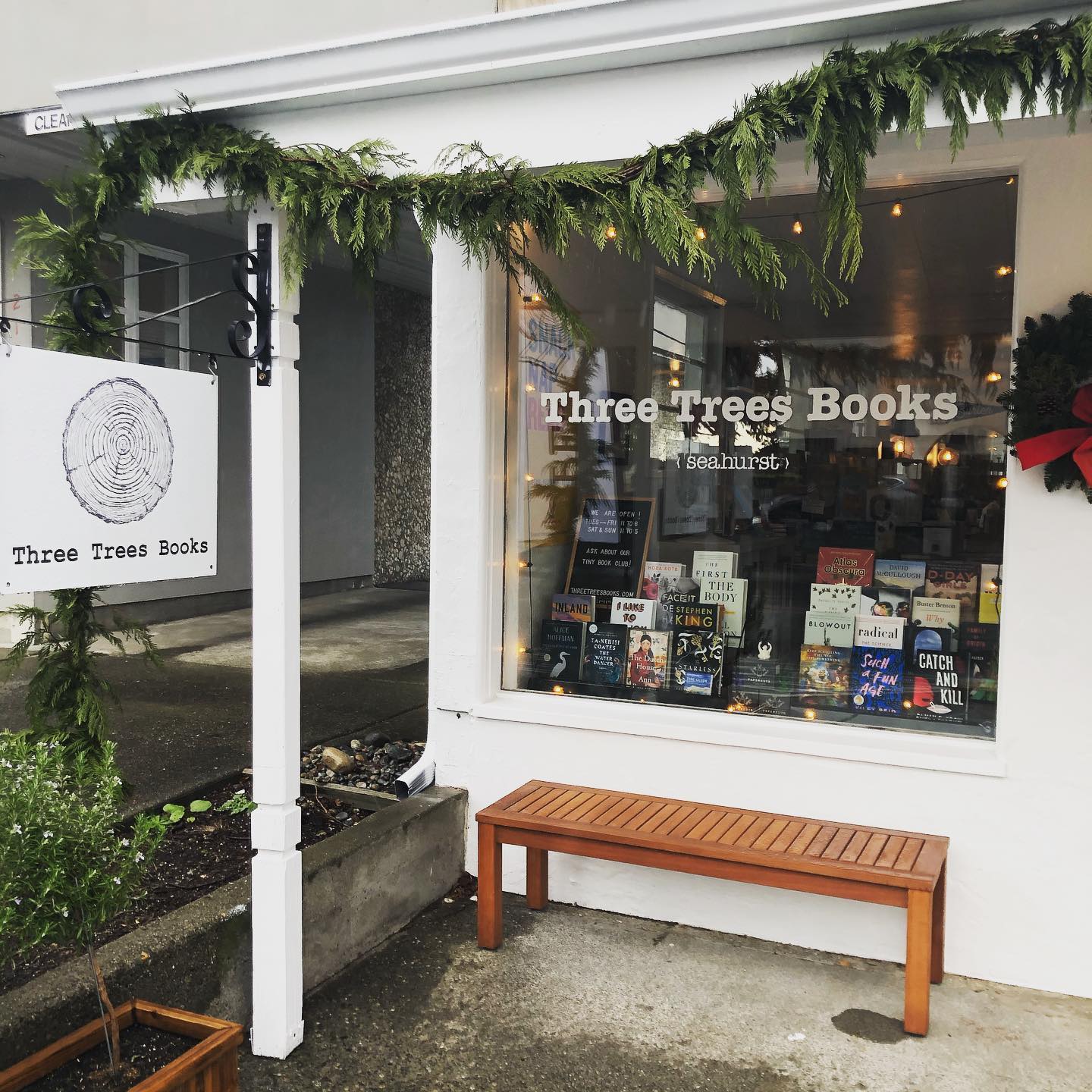
"Owning a bookstore was a dream project for me, one of those things I always wanted to do," Ingrid Miller said. "I had a career in online advertising for 25 years, but I decided I wasn't going to wait anymore.... I tried to imagine an airport bookstore, but with really good books."
Two years after opening, Miller said the bookstore "is still tiny and it is still highly curated, but it's more curated by the community than by us.... We have a couple of influencer customers who, the minute they pick up a book, I know I should order a lot of copies."
The Millers would like to find a space nearby where they could host readings that are too big for the bookshop, the Seattle Times wrote. "Encouraged by strong sales during the pandemic, they hope to eventually bring a bookseller or two on staff and expand the store's hours. It's a time of big possibilities for Three Trees Books, but the small storefront is still the center of it all."
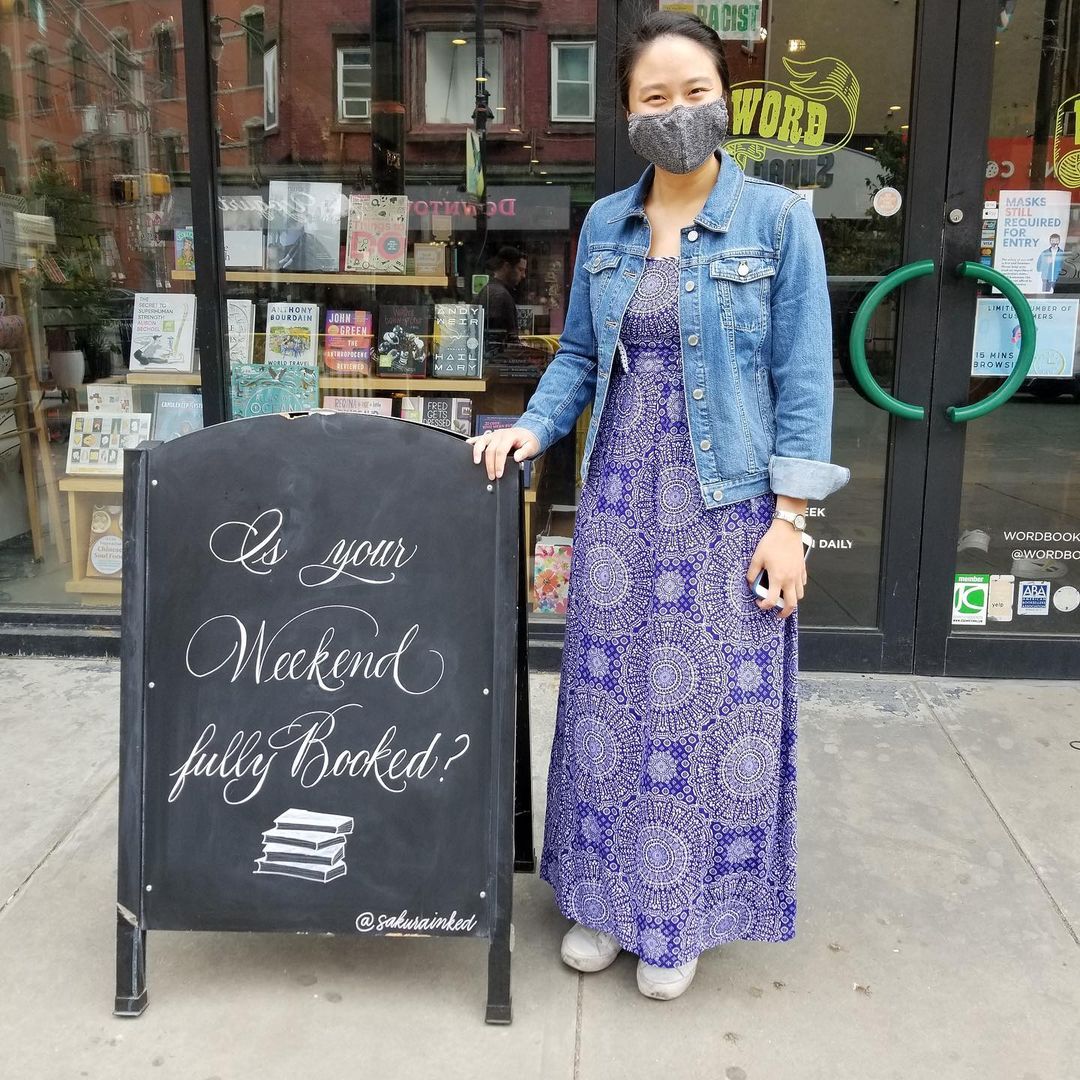 "Is your weekend fully booked?" That's the question posed by the sidewalk chalkboard at WORD Bookstore, Jersey City, N.J., which noted on Instagram: "We have the best neighbors. Thanks to JC-based calligrapher @sakurainked for making our chalkboard sign look beautiful."
"Is your weekend fully booked?" That's the question posed by the sidewalk chalkboard at WORD Bookstore, Jersey City, N.J., which noted on Instagram: "We have the best neighbors. Thanks to JC-based calligrapher @sakurainked for making our chalkboard sign look beautiful."
Erin Galloway has been promoted to publicity director at Berkley.
 Fitz and Cleo by Jonathan Stutzman, illustrated by Heather Fox (Holt Books for Young Readers).
Fitz and Cleo by Jonathan Stutzman, illustrated by Heather Fox (Holt Books for Young Readers).
Today:
CBS This Morning: Bill Cowher, co-author of Heart and Steel (Atria, $28, 9781982175795).
Apple's TV series thriller Shining Girls, based on the 2013 Lauren Beukes novel, "has finally found its directors," Variety reported. Michelle MacLaren (Breaking Bad), Elisabeth Moss (The Handmaid's Tale, Mad Men) and Daina Reid (The Handmaid's Tale) will direct the project, with Moss also starring. Beukes is attached to executive produce.
The eight-part series will be adapted for TV and executive produced by showrunner Silka Luisa (The Wilding, To the Bone). MacLaren is directing the first two episodes of the first season, with Moss directing two episodes and Reid four. Shining Girls also stars Wagner Moura (Narcos) and Jamie Bell (Rocketman).
An 18-title shortlist across three categories has been released for the Waterstones Children's Book Prize 2021, chosen by booksellers working for the chain. Category winners receive £2,000 (about $2,780), then vie for the overall title of Waterstones Children's Book of the Year 2020 and an extra £3,000 (about $4,165). Winners will be announced July 1. Check out the complete shortlist here.
Waterstones children’s buyer Florentyna Martin said: "As we celebrate another year of fantastic debut publishing, our booksellers have pinpointed the great joy and necessity of hope in difficult times. Research by the National Literacy Trust indicates that children with access to books have increasingly enjoyed reading through lockdown, with three in 10 reporting that reading helps them through sadness, particularly when they cannot see friends or family. After a year of lockdowns, this year's shortlists, brimming with hopeful and determined characters, show the importance of books and spaces dedicated to reading, and the solace that these provide. As booksellers, we know that sharing stories is a powerful experience, and we look forward to readers discovering these books with us."
 |
|
| photo: Shari Diamond | |
Joan Silber is the author of nine books of fiction. Her last novel, Improvement, won the National Book Critics Circle Award and the PEN/Faulkner Award, and she received the PEN/Malamud Award for Excellence in the Short Story. Her book Fools was longlisted for the National Book Award and was a finalist for the PEN/Faulkner Award; The Size of the World was a finalist for the Los Angeles Times Fiction Prize; and Ideas of Heaven was a finalist for the National Book Award and the Story Prize. She lives in New York, taught for many years at Sarah Lawrence College, and teaches in the Warren Wilson MFA Program. Her novel Secrets of Happiness (Counterpoint, May 4, 2021) is a profound story about the true value of family, however it may be defined in the modern era.
On your nightstand now:
Hamnet by Maggie O'Farrell: A friend gave me this--she thought Shakespeare's wife was a topic I'd want--and I'm totally transfixed.
Shuggie Bain by Douglas Stuart: I got interested because of its nomination for so many awards--I'm struck by how slum life in Glasgow is both like and unlike what we know.
The Social Life of Opium in China by Zheng Yangwen: this is for something I might be writing. Scholarly but full of surprises.
Favorite book when you were a child:
I was a big Louisa May Alcott fan--I had all her books. She can seem preachy now, but I loved the way she took the moral lives of children seriously. Another favorite was A Girl of the Limberlost by Gene Stratton Porter. A friend gave me a copy recently to re-read it. A neglected girl gets obsessed with moths and collecting specimens; the story has ambitious thoughts about nature that I think appealed to me greatly.
Your top five authors:
Anton Chekhov and Alice Munro are the writers who've had the deepest effect on my own writing. I've also loved Colm Tóibín and David Malouf. Favorite books in the past few years are A Little Life by Hanya Yanagihara and Disappearing Earth by Julia Phillips. (I know that's six.)
Book you've faked reading:
I wrote a fake book report on Don Quixote in ninth grade. I had seen a TV version and wrote eloquently about Quixote dying "in tragic triumph." When the teacher praised it in class, I naturally bragged to other kids about my fibbing, much to the dismay of the good student whose report had been used as a bad example.
 Book you're an evangelist for:
Book you're an evangelist for:
I've given away many copies of Julia Phillips's Disappearing Earth. It has amazing suspense, while using the form of linked pieces that I love.
Book you've bought for the cover:
I bought it because I love her writing, but one of my favorite covers is Andrea Barrett's The Voyage of the Narwhal, with its mountains of ice.
Book you hid from your parents:
Peyton Place by Grace Metalious. It was a bestseller considered very smutty. (I think it was sort of smutty, in that the sex was mostly ill-natured.) My mother was liberal but had her limits. They later made it into a cleaned-up soap opera.
Book that changed your life:
Best Known Works of Anton Chekhov. My father, who died when I was five, was a great collector of books, and this one has his signature.
Favorite line from a book:
"And it seemed as though in a little while the solution would be found, and then a new and splendid life would begin; and it was clear to both of them that they had still a long, long road before them, and that the most complicated and difficult part of it was only just beginning." --last line from Chekhov's "The Lady with the Dog"
Five books you'll never part with:
Books by friends:
She Read to Us in the Late Afternoons by Kathleen Hill
Whistling by Myra Goldberg
The Boy in the Field by Margot Livesey
The Sun Collective by Charles Baxter
Because We Are Here by Chuck Wachtel
Book you most want to read again for the first time:
A book I did re-read with enormous pleasure was Dickens's Great Expectations--I escaped into it after the election of 2016. It's a novel fully aware of evil--and the vices of ambition--and yet it took me elsewhere.
As it happened, soon after, I was a volunteer teacher of English in Laos for a month. One of my students, a teenage novice monk in Luang Prabang, asked if he could write a story about a book he was reading. And he wrote a version of the scene when Pip brings food to the prisoner on the marsh! I couldn't believe it--we were both thrilled. And I felt that the novel's points about money and class and loyalties made perfect sense to him.
Lorna Mott Comes Home by Diane Johnson (Knopf, $28 hardcover, 336p., 9780525521082, June 29, 2021)
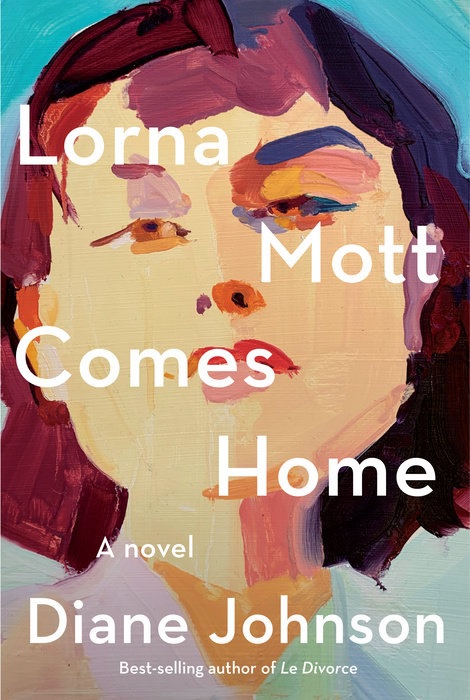 Diane Johnson (Le Divorce, Le Mariage, L'Affaire) is a go-to writer for the armchair adventurer with a taste for the urbane: she specializes in comedies of manners centered on American women in pursuit of excitement and romance in unfamiliar locales, often across the Atlantic. Lorna Mott Comes Home is an inspired inversion of the premise: it's a reentry saga revolving around an American abroad who has decided that it's finally time to return Stateside.
Diane Johnson (Le Divorce, Le Mariage, L'Affaire) is a go-to writer for the armchair adventurer with a taste for the urbane: she specializes in comedies of manners centered on American women in pursuit of excitement and romance in unfamiliar locales, often across the Atlantic. Lorna Mott Comes Home is an inspired inversion of the premise: it's a reentry saga revolving around an American abroad who has decided that it's finally time to return Stateside.
As the novel opens, 60-something Lorna Mott Dumas is flying home to San Francisco after spending 18 years in a village in southeastern France with her French husband. She will miss neither her husband's philandering nor her outsider status: "In their village, she'd always be the awkward American woman, never quite right, said to once have had some career in America, but never, ever getting the cheeses straight." Formerly a respected art historian known for her spellbinding lectures, Lorna is hoping to revive her career in San Francisco for reasons of both economy and self-respect, but the road is rocky. In fact, Lorna is finding that "the list of things that were better and easier in France was long. Now she saw that the secret message of all American folklore... was: you have to be tough to live in America."
Sorely lacking in toughness are Lorna's three grown children, all of whom are in Northern California: they've all made financial messes of their lives that they would like someone else to clean up. Able but apparently unwilling to help is their father and Lorna's first husband, Ran Mott, who has remarried into staggering Silicon Valley wealth. To Lorna's torment, Ran seems indifferent to his offspring other than the product of his second marriage, 15-year-old Gilda, who, early on in the novel, serves her parents with a surprise that ultimately affects the extended Mott clan--even Lorna.
Set in the late, financially crashing 2000s, Lorna Mott Comes Home is a sober look at a peculiarly American restlessness only exacerbated by a tanking economy. It's also a dishy drama the likes of which Johnson's readers have come to expect, with crystalline sentences and a roving point of view that can't help but give the delicious impression that characters are talking about one another behind their backs. Readers may not like the choices that Johnson's characters make--and that includes Lorna--but this is precisely what gives the book its brutal verisimilitude. --Nell Beram, author and freelance writer
Shelf Talker: This dishy but substantive comedy of manners centers on a 60-something American who, after two decades abroad, decides to divorce her French husband and come home.
Humans have always been living through the most modern era ever, no matter when that era was. What could have been better than life after the discovery of fire or the wheel? Who predicted those life-altering innovations?
.png) Few things age faster than our visions of the future. Blade Runner was set in 2019, Soylent Green in 2022 (insert plant-based meats joke here).
Few things age faster than our visions of the future. Blade Runner was set in 2019, Soylent Green in 2022 (insert plant-based meats joke here).
On May 1, 2020, I wrote: "If it feels like we're living in a present- rather than pre- or post-apocalyptic book/film/series, maybe it's because we kind of are, and that phrase 'new normal' drives the plot."
Ha! I had no idea where we were headed, which of course is still true today. In that column, I also highlighted an Oregon ArtsWatch q&a in which Sylla McClellan, owner of Third Street Books in McMinnville, was asked if she had anything special planned "for when you finally open up like normal? Or will there be a new normal?"
"Nothing planned, but I dream of Third Street being closed to traffic and people just wandering around eating, drinking, laughing," she had replied. "Live music is playing somewhere, shops are open late, and everyone is relaxed and happy to see each other again. That probably won't happen, but one can dream!"
 A year later, many things have altered, but the sales floor at Third Street Books is limited to six customers at a time, social distancing rules still apply, and recently the bookshop posted: "Hi all! We know that guidelines are changing. It's a bit confusing and frustrating. We just want to be clear: masks are still required to shop at Third Street Books. We are happy to fulfill your orders online and over the phone. We also ship books and deliver locally. Thanks!"
A year later, many things have altered, but the sales floor at Third Street Books is limited to six customers at a time, social distancing rules still apply, and recently the bookshop posted: "Hi all! We know that guidelines are changing. It's a bit confusing and frustrating. We just want to be clear: masks are still required to shop at Third Street Books. We are happy to fulfill your orders online and over the phone. We also ship books and deliver locally. Thanks!"
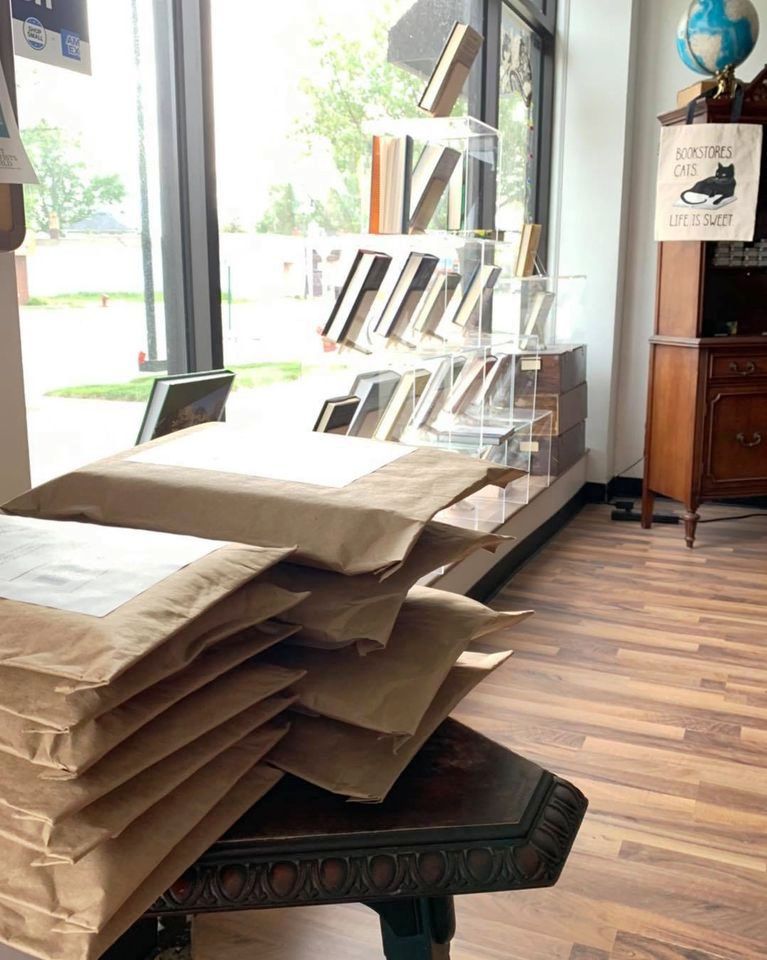 |
|
| Like all indies, Pages Bookshop, Detroit, Mich., has seen its shipping process evolve: "So many things have changed this past year and some are for the good! We changed our mailing materials to be 100% recyclable!" | |
Boxes and more boxes, mailers and more mailers, UPS and FedEx and USPS turned out to be the immediate future. Indie booksellers transformed their business model overnight from creative interaction with devoted patrons to centers for phone/online order processing, curbside pickup/home delivery fulfillment, and endless shipping/receiving cycles.
Over the past decade, as we increasingly and justifiably celebrated the pre-Covid indie bookstore renaissance (think of all those "thriving, not just surviving" headlines), our vision of the future was substantially lacking in pandemic prep scenarios.
Although there are reasons for hope as we take vaccinated baby steps toward what might be called our current potential future expectations, I found myself thinking of the past and my time travel buddy Julian West, the protagonist in Edward Bellamy's 19th century novel Looking Backward: 2000-1887.
 On Decoration Day (now Memorial Day) in 1887, Julian, a privileged insomniac, enters his custom-made, hermetically sealed, subterranean sleeping chamber and, under a mesmerist's spell, wakes up in the year 2000. Quite suddenly, the future is present.
On Decoration Day (now Memorial Day) in 1887, Julian, a privileged insomniac, enters his custom-made, hermetically sealed, subterranean sleeping chamber and, under a mesmerist's spell, wakes up in the year 2000. Quite suddenly, the future is present.
Among many revelations, West discovers that the book trade essentially operates as a POD self-publishing model in which the "printing department... is bound to print all that is offered it, but prints it only on condition that the author defray the first cost out of his credit. He must pay for the privilege of the public ear, and if he has any message worth hearing we consider that he will be glad to do it."
I wrote about Julian's future in another May column, back in 2007, suggesting that from his modern world perspective in the late 19th century, Bellamy couldn't have envisioned BookExpo America, "which reminds us every spring that a promising future always trumps a muddled present. But the future is more than just idle speculation in our business; it is the water in which we swim. We routinely read in the future--manuscripts, catalogs, ARCs--and at BookExpo, the full utopian vision is on display. Books always promising; any book might grow up to be a bestseller. The past is largely absent from BookExpo, except in the shadows of the remainder pavilion."
Had I been asked then to predict what the book business would look like in 2021, a completely vanished BEA and a disastrous global pandemic would not have been on my list.
Earlier this spring, the Wall Street Journal sorted through a few predictions for new normal scenarios ("On Business: No Shoes, No Mask, No Service?"; "Attention Shoppers! We'll Never Buy the Same Again"; "The Trade Show Plots Its Comeback," etc.). They seemed reasonably speculative, but I was more impressed with Jason Gay's column, headlined "As a Window Opens, a Plea for Patience and Grace," which offered a humane take on the future, immediate and otherwise.
"It's not going to be instant," he wrote. "It's not going to feel like flipping a switch. Hidden traumas abound. I presume we're all a little different now. How can we not be? This past year has challenged everyone in unforeseen ways, and a lot of us are just coming to terms with it. There are probably changes still imperceptible.... The road may be opening up, but the road remains long." Even an experienced time traveler can't quibble with that.